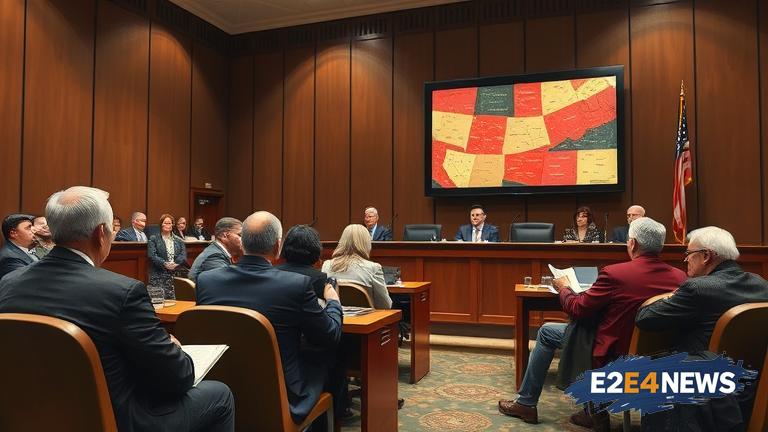The Texas House redistricting committee’s recent hearing in Houston has been met with criticism and outrage from the community, as the committee failed to provide maps of the proposed redistricting plans. This lack of transparency has sparked concerns over the potential for gerrymandering and unequal representation. The hearing, which was intended to gather public input on the redistricting process, was seen as a crucial opportunity for citizens to have their voices heard. However, without the provision of maps, many attendees felt that their comments and concerns were being made in the dark. The committee’s decision not to release the maps has been widely criticized, with many arguing that it undermines the integrity of the redistricting process. The redistricting process is a critical aspect of American democracy, as it determines the boundaries of electoral districts and can have a significant impact on the representation of different communities. In Texas, the redistricting process is particularly contentious, as the state’s growing population and shifting demographics have created a complex landscape for map-drawers. The Texas House redistricting committee is responsible for redrawing the state’s congressional and legislative districts, a task that must be completed every ten years following the census. The committee’s failure to provide maps has raised concerns that the redistricting process may be biased towards certain interests or groups. Many attendees at the hearing expressed frustration and disappointment, feeling that their comments and concerns were not being taken seriously. The lack of transparency has also sparked concerns over the potential for partisan gerrymandering, where district boundaries are manipulated to favor one party over another. The Supreme Court has ruled that partisan gerrymandering is unconstitutional, but the lack of transparency in the Texas redistricting process has made it difficult to determine whether the committee’s actions are in compliance with the law. The controversy surrounding the Texas House redistricting committee’s hearing in Houston is just the latest example of the challenges and complexities of the redistricting process. As the committee continues to work on the redistricting plans, it is essential that they prioritize transparency and public input to ensure that the process is fair and representative of all communities. The committee’s actions will have a significant impact on the state’s electoral landscape, and it is crucial that they are held accountable for their decisions. The Texas redistricting controversy has also highlighted the need for greater transparency and accountability in the redistricting process nationwide. As the country continues to grapple with issues of representation and fairness, it is essential that the redistricting process is conducted in a transparent and inclusive manner. The Texas House redistricting committee’s failure to provide maps has set a troubling precedent, and it is essential that the committee takes steps to address these concerns and ensure that the redistricting process is fair and representative of all communities. The committee’s actions will be closely watched in the coming weeks and months, as the redistricting process continues to unfold. The controversy surrounding the Texas House redistricting committee’s hearing in Houston has sparked a wider conversation about the need for greater transparency and accountability in the redistricting process. As the state and nation continue to grapple with issues of representation and fairness, it is essential that the redistricting process is conducted in a transparent and inclusive manner. The Texas redistricting controversy has highlighted the need for greater transparency and accountability in the redistricting process, and it is essential that the committee takes steps to address these concerns. The committee’s failure to provide maps has raised concerns over the potential for gerrymandering and unequal representation, and it is essential that the committee prioritizes transparency and public input to ensure that the process is fair and representative of all communities. The Texas House redistricting committee’s hearing in Houston was intended to gather public input on the redistricting process, but the lack of transparency has undermined the integrity of the process. The committee’s actions will have a significant impact on the state’s electoral landscape, and it is crucial that they are held accountable for their decisions. The controversy surrounding the Texas House redistricting committee’s hearing in Houston has sparked a wider conversation about the need for greater transparency and accountability in the redistricting process, and it is essential that the committee takes steps to address these concerns.
